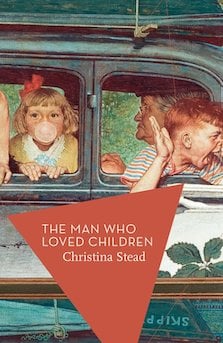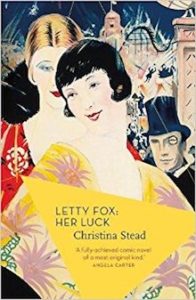The Man Who Loved Children by Christina Stead (1940 / 1965)
By Taylor Jasmine | On October 30, 2017 | Updated December 18, 2022 | Comments (0)

The Man Who Loved Children by Christina Stead, the Australian author, was originally published in 1940. But it wasn’t until this novel was reissued twenty-five years later, in 1965, that it received critical acclaim and a wide audience.
Sam Pollit the title character, is the father and husband in the dysfunctional Pollit family. Supposedly, he was inspired by Stead’s father, a marine biologist. Egotistical, perhaps even narcissistic, Sam dominates the blended family, especially his wife Henny and older daughter Louie.
When it was first published, The Man Who Loved Children was set in Sydney. The reissued edition changed the venue to Washington, D.C. as a way to appeal more to American readers.
A story that’s both a telescope and a microscope
In a June, 1965 review in The New York Review of Books, Christopher Ricks wrote:
“The Man Who Loved Children is superb as both a telescope and a microscope. It sweeps horizons as confidently and commandingly as it sweeps to bacteria … no other novel makes so scrupulous, so passionate, and so convincing a study of a family—and with such generalizing force that one immediately expands that to the family.
Samuel Clemens Pollit, who loved children, and his wife Henny, who often did not love children at all but yet almost always respected them as Sam never does: this marriage is rendered with brilliant specificity and sense of context. The seven children are a living, changing family—not, as so often, an artful background.”
Here’s another 1965 review that, like many others, acknowledges the book as a modern masterpiece:
A 1965 review of The Man Who Loved Children
From the original review by Alan Pryce-Jones of The Man Who Loved Children by Christina Stead, High Point enterprise, June 1965:
Christina Stead has published eight books the last of them in 1952. The Man Who Loved Children had the bad luck to appear in 1940, when the world had other things to think about than the ill-fortune of an unhappy heiress and her hopeless husband.
Perceiving that the book is very nearly a masterpiece, and at the least an unforgettable novel, her publishers have relaunched it for its 25th anniversary. A newer generation can now suffer with the Pollits. Can, and should.
A family lacking money, sense, and love
Sam Pollit has risen in the world. His first wife dead, leaving one daughter, he has remarried Henny gives him six more children, and the prestige of a rich father-in-law.
When the book opens, they are living in a run-down Georgetown house. Louie, the eldest child, is eleven and a half. All that is lacking in the house is money, sense, and above all, love.
Sam, who thinks he provides love, is a fool. So bent is he on do-gooding for the world in general that he barely notices what goes on under his own roof. Henny, half-crazed by ill health, a spoiled upbringing, and natural sourness of character, actively detests him and her stepdaughter, and can cope neither with her own brood nor the housekeeping.
A turning point comes when Henny’s father dies, leaving little but debts, and the family moves to still seedier circumstances in Maryland.
. . . . . . . . . .

. . . . . . . . . . .
A story with more texture than plot
The plot of the book is less important than its texture. Miss Stead has contrived a picture of family life which has not been exceeded in rich horror since the days of Samuel Butler. Her book fails to be a masterpiece because the horror is piled on too indulgently. The rows, fainting, fits, cruelties, incomprehensions, screaming matches, and terrors overwhelm the reader.
For page after page Sam’s baby-talk and Henny’s tirades are set out in full, at first with massive effect, but finally blunting the mind. Yet the interlocking, the swaying to and fro of each unit in this domestic guignol is wonderfully subtle, and helped by a Joycean opulence of language.
When needed, furthermore, Miss Stead can call on a beautiful economy of effect. At one point we accompany Sam on a scientific mission to Singapore. During two brief conversations, with an Indian clerk and a Chinese secretary, he reveals himself totally; a bumbler of admirable intentions beside whom Graham Green’s Quiet American is Einstein.
In his Introduction, Randall Jarrell stresses the discouragement which virtually silenced its author after the first failure of her “most profound and imaginative book.”
I know very few novels which both communicate an accurate shudder — for Miss Stead’s observation is precise to the last millimeter — a proper indignation, and beneath it all, true compassion. The Man Who Loved Children does all that, and with stereoscopic intensity of vision as well.
. . . . . . . . . . .

See also: Letty Fox: Her Luck by Christina Stead
. . . . . . . . . . .
More about The Man Who Loved Children
- Wikipedia
- Reader discussion on Goodreads
- Jonathan Franzen: Rereading The Man Who Loved Children
- Jane Smiley on The Man Who Loved Children
Leave a Reply